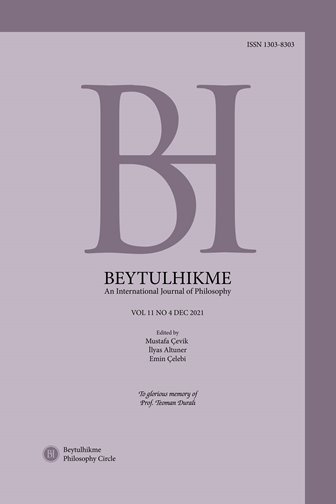Author :
Abstract
Bu makale temel olarak insanın, erdemliliği karakterinin bir parçası haline getirmeye çalışırken ne tür bir bilinç düzeyine sahip olduğu meselesini tartışmaktadır. Bu tartışmada Aristoteles, erdemliliğin yerleşik hale gelmesinin, bilincin eşlik ettiği bir süreci zorunlu kıldığını savunur. İnsanda bu bilincin ortaya çıkışı ile pratik bilgelik arasında sıkı bir ilişki söz konusudur. Pratik bilgeliğe sahip insan, belirli ahlâkî ilkelere uygun davranmayı başarmış biri olmaktan daha öte erdemliliği karakterinin bir parçası haline getirmiş insandır. Buna karşılık Julia Driver bir bütün olarak erdemliliğin bilinç içerdiği tezine itiraz etmez. Fakat o, erdemlerin tümü olmasa bile en azından bir kısmının, insanın bilinç ve iradesi dışında yerleşik hale geldiği kanaatindedir. Öyle ki tevazu gibi birtakım erdemlerin insanda yerleşik hale gelmesi bilinç içeren bir süreci gerektirmez. Bu makalede erdem-bilgi ilişkisi bağlamında, tevazu erdeminin insanın kendi gerçekliğini en yalın haliyle hissedebildiği gerçekçi bir tutumu içerdiği tezi savunulmaktadır. Buna göre mütevazi insan, nasıl bir insan olması gerektiğinin farkında, fakat sahip olduğu değer ile tevazu erdemi arasındaki ilişkiyi tam olarak kavrayabilmiş değildir.
Keywords
Abstract
This article basically addresses the issue of what kind of level of consciousness man has when trying to make virtuousness part of his character. In this discussion, Aristotle argues that the entrenchedness of virtue necessitates a process accompanied by consciousness. There is a close connection between the emergence of this consciousness in man and practical wisdom. A person with practical wisdom is a person who has made virtuousness a part of his character rather than someone who has managed to act in accordance with certain moral principles. Julia Driver, on the other hand, does not deny the thesis that virtue as a whole requires consciousness. However, she believes that at least some, if not all, of the virtues, have been rooted without man's consciousness and will. So that, the entrenchedness of certain virtues, such as modesty, does not require a process of consciousness. In this article, in the context of the virtue-knowledge relationship, the thesis is defended that the virtue of modesty involves a realistic attitude in which one can feel one's own reality in its simplest form. Accordingly, the modest person is aware of what kind of person he should be, but he has not fully grasped the relationship between the value he has and the virtue of modesty.
Keywords
- Aristoteles. (2014). Nikomakhos’a Etik (çev. S. Babür). BilgeSu.
- Batak, K. (2017). Aristoteles’ten Ernest Sosa’ya Erdem Epistemolojisi. İZ Yayıncılık.
- Brennan, J. (2007 ). Modesty without Illusion. Philosophy and Phenomenological Research, LXXV(1), 111-128.
- Çınar, A. (2007). Aristoteles’in Nikomakhos’a Etik’inde Pratik Hikmet Kavramı ve Günümüz Açısından Önemi. Uludağ Üniversitesi İlahiyat Fakültesi Dergisi, 16(1), 171-192.
- Durak, N. (2015). Kınalızâde’de Bir Erdem Olarak Tevazu. Süleyman Demirel Üni- versitesi İlahiyat Fakültesi Dergisi, 35(2), 105-123.
- Dolin, J. (2020). A Dilemma for Driver on Virtues of Ignorance. Ethical Theory and Moral Practice.
- Driver, J. (1999). Modesty and Ignorance. Ethics, 109(4), 827-834.
- Driver, J. (2001). Uneasy Virtue. Cambridge University Press.
- Driver, J. (2012). Consequentialism. Routledge.
- Feltz, A. C., Edward T. (2012). The Virtues of Ignorance. Rev.Phil.Psych.(3), 335– 350.
- Flanagan, O. (1990). Virtue and Ignorance. The Journal of Philosophy, 87(8), 420-428.
- Hare, S. (1996). The Paradox of Moral Humility. American Philosophical Quarterly, 33, 235-241.
- Hökelekli, H. (2007) Tevazu (Alçak Gönüllülük). Değerler Eğitim Merkezi Bülteni, (2) 114-119.
- Hursthouse, R. (1991). Virtue Theory and Abortion. Philosophy and Public Affairs, 20(2), 223-246.
- Hursthouse, R. (1999). On Virtue Ethics. Oxford University Press.
- Kupfer, J. (2003). The Moral Perspective of Humility. Pacific Philosophical Quarterly, 84(3), 249–269.
- Plato. (1997). Protagoras. J. M. Cooper (Ed.), Complete Works (pp. 746-790). Hackett Publishing Company.
- Schueler, G. F. (1997). Why Modesty Is a Virtue. Ethics, 107(3), 467-485.
- Schueler, G. F. (1999). Why Is Modesty a Virtue? Ethics, 109(4), 835-841.
- Statman, D. (1992). Modesty, Pride and Realistic Self-Assessment. The Philosophical Quarterly, 42(169), 420-438.
- Van Zyl, L. (2019). Virtue Ethics: A Contemporary Introduction. Routledge.
- Veríssimo, L. (2014). Julia Driver’s ‘Virtues of Ignorance’. C. M. Rui Vieira da Cunha, Sofia Miguens (Ed.), From Minds to Persons (ss. 255-267). Universidade do Porto. Faculdade de Letras.
- Winter, M. (2012). Rethinking Virtue Ethics. Springer.





